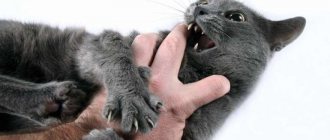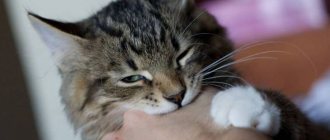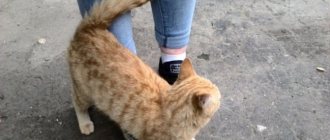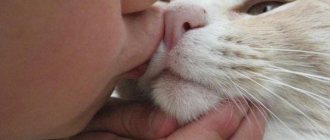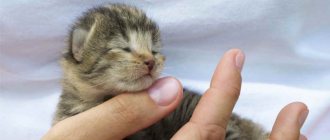And so, you decided to pet your cat. Your hand slides over the soft fur, and in response you hear a grateful purr. And everything would be fine, but this idyll has an unexpected ending. The cat suddenly releases its claws and digs its teeth right into your hand. And why would that be? Despite the absence of visible reasons, there is nothing surprising in this behavior. Let's figure out why cats change mercy for anger so quickly and how to stop a cat from biting when you pet it.
Reasons for strange biting
According to experts, a cat can bite its owner in the most peaceful and calm situation under the influence of a number of factors:
- Lack of training is most typical for kittens or animals whose training is not given due attention. Sometimes a cat may experience fear towards a person, especially if it has recently entered the house, which gives rise to aggression as a defensive reaction.
- Play is also a characteristic manifestation for babies, who, biting and scratching, have so much fun spending time with their beloved owner.
- Self-preservation instincts - most cats do not like stroking and touching in the abdomen. Even gentle movements in this area can provoke aggression. You should also not stroke your pet's hind legs, since most cats feel vulnerable and are capable of reacting inappropriately to affection. We should also pay attention to the tail - the area where nerve endings are concentrated. Even the slightest touch to the tail causes pain and discomfort in cats.
- Negative memories - an animal may react inadequately to manifestations of love if it has recently undergone vaccination, bathing, claw trimming and other unpleasant procedures.
- Maternal instinct - manifests itself in cats expecting the birth of offspring or nursing kittens.
- Manifestation of dissatisfaction - if a usually friendly pet begins to bite and scratch when stroking it, then perhaps he is simply hungry or wants to sleep.
- Pain – painful sensations and poor health often cause anger in cats. Especially if the owner does not deliberately touch the area where the diseased organs are located.
- Birth injuries – the birth process in cats is often difficult, leading to slight pinching of the kitten’s spinal column, in the area near the tail. Naturally, touching in this area causes pain, discomfort and a desire to defend itself. If your pet reacts by biting precisely when this area is touched, then you should simply concentrate the stroking on other places. Most cats love to be stroked behind the ears or at the withers.
These are the main reasons that should be taken into account if your pet does not behave friendly when trying to express your affection and love to it.
It is important to monitor the animal’s condition; in some cases, nervous reactions are a reason to change the cat’s living conditions or seek help from a veterinarian.
Pay attention to the signals
Perhaps the bite came as a surprise to you, but if you take a closer look, the cat was probably giving you signals that the caresses had become unpleasant to him. Take a closer look, maybe you will have time to notice some of them before it comes to a fight.
- The cat raised its muzzle and looks at the hand
- The cat flattened his ears
- The pupils suddenly dilated or constricted
- The cat beats his tail
- Backing away
- Tries to run away
- Meows
- He tries to bend under his hand so that it doesn’t touch him in any way.
Don't let things get to the point of bites! Observe the signals and stop stroking as soon as the mustache gives them. In this way, you will let him know that you are ready to stop unpleasant actions based on a signal from your tail, not your teeth. Over time, such training will teach the cat to give you correct and harmless signals , because he will know that they work.
Up Improve your technique
Petting cats is an art. This is not playing the drum, but rather playing the cello. Force and rudeness are not needed here, but improvisation is valued. To touch the delicate strings of a cat's sensitive soul, act gently, do not be nervous and do not scratch the cat in the same place for several minutes.
We often pet cats automatically when we are busy doing something. For example, we watch TV. At this moment, our hand makes the same movements along the same trajectory, which can irritate the pet. Pay attention to this!
Learn where the cat enjoys touching and where stroking is prohibited. As a rule, cats love to be stroked on their face, neck, back of the head, and allowed to stroke their back, but touching their belly and paws is a provocation. But remember: your cat may be the exception to the rule. Check it out!
Up
Features of cat psychology
We should not forget that cats, by their nature, are independent animals that need privacy. With frequent contact with a person, endless display of affection, and the inability to be alone with itself, a cat can become irritable, nervous and aggressive.
It is worth paying attention to such behavioral features as tension, pressing ears, wagging the tail, dissatisfied rumbling, hissing, dilated and enlarged pupils. In this case, it is better to leave the pet alone for a while and wait until it itself shows a desire to communicate with the owner.
Veterinarians explain the state of aggression by the fact that cats have an increased sensitivity threshold compared to humans and other pets. In addition, the animal may simply be in a state of nervous excitement, requiring temporary rest and solitude.
In some situations, a cat, and especially a male cat, can demonstrate its dominant behavior in this way, showing who is the leader. This kind of behavior should definitely be stopped in order to avoid more serious problems in the future.
Control over the owner
Cats are much less likely than males to respond with aggression to the affection of their owner. After all, males constantly strive to take a leading position in any “group,” even if it mainly consists of only people. And females are naturally softer and more flexible.
Accordingly, a sharp bite of the owner’s hand, immediately following a warm “hug,” can be regarded as the pet’s reluctance to obey a specific person.
In this way, the individual demonstrates that she is in charge, and it is she who decides who, when and how much can be stroked.
In addition, a pet may refuse prolonged stroking due to its temperament.
After all, not all cats want to sit on their arms all the time. For some, it’s enough to just lie next to them for a few hours, while for others it’s enough to just rub their leg or arm just once.
Pets can scratch and bite even when they are in a good mood. This can be observed in young, highly active individuals.
So, a sensitive, understanding and loving owner will accept his mustachioed and tailed pet the way nature created him.
And if the animal suddenly unexpectedly begins to tense up, change its body position or press its ears to its head, then the owner will simply leave it alone. In this case, both the psyche of the pet and the hands of the owner will remain intact, which means that no one will be offended by anyone.
Pathological conditions
The exact reasons why a cat bites can only be determined by carefully observing your pet. Apathy, lethargy, bowel movements, permanent lack of appetite, combined with aggressive behavior, may be symptoms of a serious illness that requires immediate attention to a veterinary clinic.
If the cat has never bitten before and behaved peacefully, then a sudden change in behavior may indicate the development of certain pathologies, for example:
- infectious and inflammatory processes;
- periodontitis;
- cervical arthritis;
- renal pathologies.
Traumatic injuries, sometimes invisible to the naked eye, also cause severe pain to the animal, especially when touched.
Tags
about cats Information Why does a cat bite Feeding kittens Feeding kittens Feeding and feeding Feeding and feeding is worth feeding an animal is worth feeding an animal Dry food dry food for love cats Breeds of cats. some cats develop encouraging cats to breeds of cats. for cats. In cats, such cats can Among white cats, considers cats quite 1 dog one dog 1 dog refuseniks dog with two dogs with two dogs black dog according to advertisement 7 dogs 1 dog all 1 dog
feedcommenttoiletflighttreatscatmedicinesremediesfleasmore ticks
If affection gives way to aggression
Often, cat owners are faced with a completely incomprehensible situation: a furry pet first purrs and caresses, and then suddenly suddenly changes its mood and begins to bite. Animal psychologists believe that the reason for this strange behavior is:
- Demonstration of independence . The fact is that predatory, hunting instincts are given to representatives of the cat family by nature itself. Therefore, an animal can exchange anger for mercy and, conversely, show that it is ready to give and receive affection only according to its mood and will not tolerate intrusiveness.
- Change of mood . Initially, stroking can really be pleasant for a furry pet, but after a while the cat gets tired of it, its mood changes, and with light bites it shows the owner that it is enough for now with displays of tenderness.
- The desire to keep the situation under control . Bites are a way to show that further events will develop depending on the pet’s wishes.
- Distrust of people – this pattern of behavior is often observed in animals picked up from the street, who have had to deal with human cruelty more than once. Therefore, the new member of the family will need a lot of time to adapt, and the owner will need patience.
In such situations, it is better to simply not bother the cat with your attention and try to correct its behavior in gentle but effective ways.
What does it mean if a cat first bites and then starts licking?
Experts give an unexpected answer to this question. It is believed that if an animal first bites and then licks a person, then it sees in him an equal to itself, and therefore treats it as it treats another cat. This is how cats show their behavior patterns.
There are cases when cats try to prove to their owner with their bite that they are sick or feel some kind of discomfort. Pets often lick damaged or diseased areas of their body. If a person touches this area, the animal may bite him.
Some cats, when licking their loved ones, themselves get great pleasure from this process. When an animal feels pain, it tries to hide it from strangers. Only an attentive owner will be able to notice that something wrong is happening to his pet. In case of the slightest suspicion, the animal must be shown to a veterinarian.
What can influence a pet's character?
Some physiological and psychological aspects can also affect the character of cats, changing their behavior and attitude towards the owner and his affection. Unexpected aggression, manifested for no apparent reason, can be provoked by:
- Puberty . At this time, young cats behave like teenagers - aggressively, demonstratively. This is explained by hormonal surges and the emergence of new physiological needs. The solution here would be to find a mate for the pet or castration.
- Declawing is a major stressor for your pet. Feeling vulnerable and defenseless, a cat may try to defend itself with its teeth, even without visible potential danger.
- Lack of attention and care . Lack of communication and poor living conditions do not have the best effect on the psychological state of a pet. Therefore, it is worth finding about 15-20 minutes every day to play with your pet.
- Changing baby teeth to molars is accompanied by itching and unpleasant sensations in the gum area in kittens, which they try to eliminate with bites. Providing your pet with special toys designed for these purposes will help solve the issue.
Only by finding out the reasons for the strange behavior of your furry pet can you find the right options for its correction.
Diseases
Why does a kitten bite: for no reason or when you pet it
? Why cats rush to their feet in order to bite becomes clear when it comes to the health of the pet. This is the worst case scenario when the cause of this behavior is a disease of the cat's brain, such as a tumor.
This type of pet health problem can turn the sweetest little kitten into a crazy beast. Aggression caused by illness does not appear suddenly. Changes occur slowly as the disease progresses.
Not only brain diseases can negatively affect a cat’s behavior. Other diseases also have similar effects. Especially those for whom it is long and debilitating.
When sick, a cat may experience discomfort and show aggression. The best solution in this case is to visit a veterinarian, make an accurate diagnosis and timely treatment.
Health conditions may cause aggressive behavior in your pet
How to stop a cat from biting
Stopping a cat from biting and scratching, especially when being petted, is a fairly simple task. Initially, it is important to make sure that the animal is healthy, receives enough attention and at the same time has the opportunity to retire and relax. If provoking factors are excluded, then you can use the following educational methods:
- Education and repetition . Every time you try to bite, you should spray the animal with a spray bottle, blow it with a hairdryer, or simply press it to the surface, as mother cats do. At the same time, say in a calm, but confident, firm voice that you cannot do this.
- Ignoring and isolation . If a pet behaves inappropriately, it is recommended to ignore it for a certain time and not pay attention. As a rule, the animal learns such lessons well and does not repeat its mistakes.
- Noise impact . You can scare a cat and wean it from the desire to bite by loudly clapping your hands whenever it shows aggression.
- Hanging a cat by the withers for a few seconds has a good effect.. This manipulation relieves aggression and reminds of the lessons learned in childhood from the mother.
Systematic implementation of these rules will soon help wean your pet from the bad habit of biting when stroking.
Just boring
Our mustachioed pets are forced to independently introduce variety into their daily lives. In a situation where a cat is bored, it may seem interesting to him to cheer up a little and attract attention to himself by sinking his fangs into the hand of his beloved owner or the leg of a passing mistress... or, lying next to a person, simply chewing his finger.
In this case, you need to pay attention to the cat - play with him or come up with interesting entertainment for him... until he completely eats you
